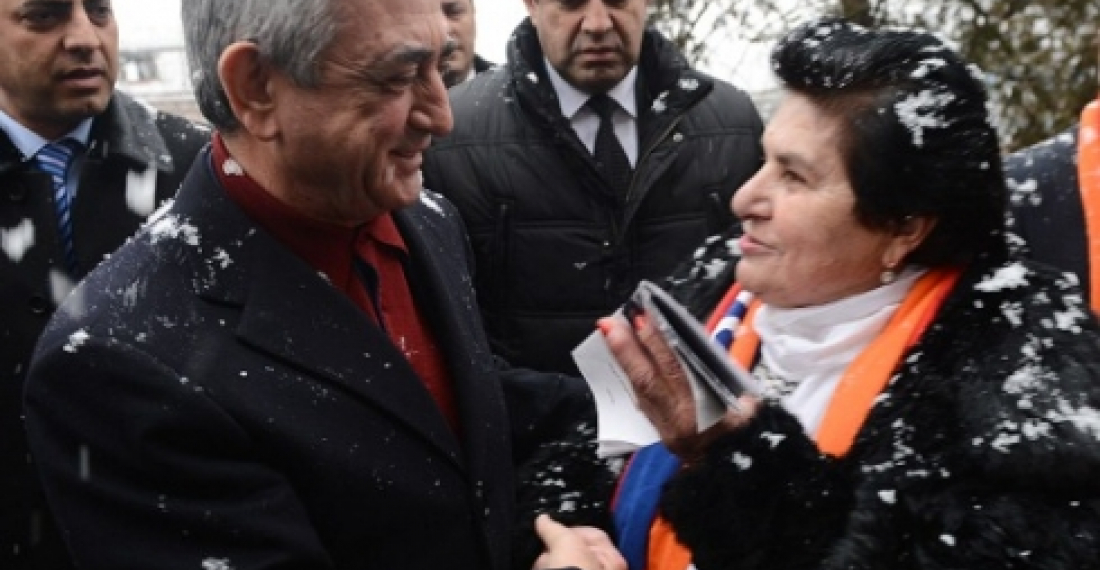Armenia will go to the polls on Monday, 18 February to elect the next President. The names of seven candidates will be on the ballot paper, but with most of the opposition parties distancing themselves from the process the election is being considered a one-horse race with the incumbent president Serzh Sargsyan favorite to win an outright victory in the first round.
This has not deterred President Sargsyan from campaigning vigourosly. He has been touring the country addressing election meetings on a wide range of issues. In most of his speeches Sargsyan has made reference to the Karabakh conflict and its possible solution. The President on Wednesday lashed out at Azerbaijani policy. Armenia's Public TV (Channel 1) reported that speaking in Yerevan's Ajapnyak District Sargsyan lashed out at the Azerbaijani authorities over the 2012 pardon of a soldier convicted of killing an Armenian soldier in Hungary, and the more recent furore over an Azerbaijani writer who published a story deemed to be pro-Armenian."Today a person who had hacked to death an Armenian walks around in that country as a hero, and books are being burned and a reward is being offered for the ear of the writer," Sargsyan said, adding a quotation from Heinrich Heine "where books are burnt people will be burnt too."
Public TV's correspondent further quoted the president as saying in Ajapnyak that the movement for Karabakh to secede from Azerbaijan and join Armenia was non-violent when it started in the 1980s and that the independence movement was not based on hatred towards ethnic Azeris. The President, speaking earlier in Yerevan's Nork Marash's district said that war was not a solution for the Karabakh conflict and that the Azerbaijani authorities should not repeat the mistake that they made twenty five years ago and should engage more constructively with the negotiations. Sargsyan assured his audience that the airport in Nagorno-Karabakh will be opened and that he would be one of the first passengers to travel to it. he said that claims that the airport would be used to transfer military supplies "were fairy tales".
Earlier, speaking in Erebuni District, Sargsyan dismissed as great adventurism calls by other Presidential candidates for Armenia to officially recognise the independence of Nagorno-Karabakh. Referring to a speech by Presidential Candidate and former Foreign Minister Raffi Hovhanessian, Sargsyan said "Do you realize what it will mean to recognize Nagorno-Karabakh Republic? There could be no greater adventurism at the moment. And this statement is made by a man who is introducing himself as a good expert in foreign policy".
As the election campaign draws to an end there are reports of heightened tensions on the front line separating Armenian and Azerbaijani forces. The Azerbaijani Army said on Wednesday that it had started large scale military manoevres around the Terter Region. Russian media in the mean time reported that Armenian and Russian military units were holding joint exercises in the same region, although no official confirmation from this came from the Armenian side.
Commonspace.eu political editor said in a comment: "It has become part of a pattern for tensions to increase on the front line during election periods in Armenia and Azerbaijan. Part of the reason for this is that forces are put on a high degree of alertness and this becomes a self fulfilling prophecy. The sides also try to exploit moments of domestic political tension. There is some hope that after next week the sides may be able to focus back on the negotiating process, but in both countries the debate on Karabakh is becoming increasingly enmesshed in the domestic political debate and this is going to make negotiations even more difficult then before"
source commonspace.eu with Armenian Public TV (Channel 1)
Photo: President Sargsyan meeting voters in a district of yerevan on 12 February 2013. (picture courtesy of the election website of Serzh Sargsyan)







